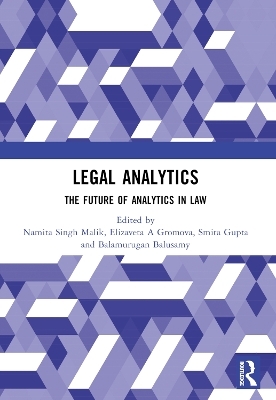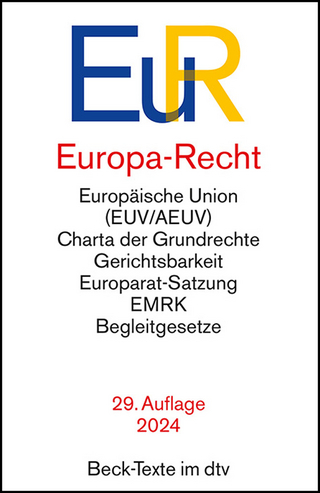
Legal Analytics
Chapman & Hall/CRC (Verlag)
978-1-032-38207-4 (ISBN)
Legal Analytics: The Future of Analytics in Law navigates the crisscrossing of intelligent technology and the legal field in building up a new landscape of transformation. Legal automation navigation is multidimensional, wherein it intends to construct streamline communication, approval, and management of legal tasks. The evolving environment of technology has emphasized the need for better automation in the legal field from time to time, although legal scholars took long to embrace information revolution of the legal field.
• Describes the historical development of law and automation.
• Analyzes the challenges and opportunities in law and automation.
• Studies the current research and development in the convergence of law, artificial intelligence, and legal analytics.
• Explores the recent emerging trends and technologies that are used by various legal systems globally for crime prediction and prevention.
• Examines the applicability of legal analytics in forensic investigation.
• Investigates the impact of legal analytics tools and techniques in judicial decision making.
• Analyzes deep learning techniques and their scope in accelerating legal analytics in developed and developing countries.
• Provides an in-depth analysis of implementation, challenges, and issues in society related to legal analytics.
This book is primarily aimed at graduates and postgraduates in law and technology, computer science, and information technology. Legal practitioners and academicians will also find this book helpful.
Dr. Namita Singh Malik is working as Dean and Professor at the School of Law, Galgotias University, India. She has 15 years of experience in the field of law. Her teaching and research interest lies in the area of gender studies, criminal laws, forensic science, and law and technology. She has more than 25 research paper presentations and publications. Dr. Elizaveta A. Gromova is Associate Professor and the Deputy Director for the International Cooperation and the Coordinator of the LLM Program "Law and Digital Technologies" of the Institute of Law of South Ural State University (National Research University), Russia. She is also a researcher at the International Research Projects "LegalTech: Legal Regulation of AI and Robotics, Legal Provision of the Digital Economy and Creation of the Smart Law for Smart Industry" and "Legal Regulation of the Implementation of the Components of Digital Industry in Industrial Regions." She is also an author of the monograph and textbook and numerous articles in the sphere of business law and law and digital technologies. Dr. Smita Gupta is Associate Professor at the School of law, Delhi Metropolitan Education, affiliated with Guru Gobind Singh Indraprastha University, Delhi. She has vast teaching experience of more than 15 years in interdisciplinary areas of law and social sciences. Her area of interest lies in exploring multifaced dimensions of law with a special focus on associative links of sociology and crime. Dr. Balamurugan Balusamy completed Ph.D. at VIT University, Vellore, and is currently working as Professor at Galgotias University, Greater Noida, Uttar Pradesh. He has 15 years of teaching experience in the field of computer science. His area of interest lies in the field of artificial intelligence, Internet of Things, big data, and networking. He has published more than 100 international journal papers and contributed book chapters.
1. Artificial Intelligence, Automation & Legal System. 2. Moving One Step further: The Integration of AI-based mechanisms into the Indian Judicial System. 3. Using AI to address criminal justice needs problems & perspectives. 4. Artificial Intelligence inroads into the Indian Judicial System. 5. The role of language prediction models in contractual interpretation: The challenges and future prospects of GPT-3. 6. The impact of New Technologies on Taking Evidence in Civil Court Procedures – Is There a Need for
a Conceptual Change? 7. Legal Analytics on the Role of Intellectual Property and Digital Health System in Overcoming Public Health Emergency. 8. Automation in labour Sector and its effects and challenges on jobs creation: an analytical study. 9. Water Scarcity: A Global Threat to Access Human Right to Clean Water. 10. The Development of Transportation Sector in the Ages of Automation. 11. Big Data Analytics: The New surveillance Discretion for Criminal Justice System. 12. The use of inclusive digital technologies to improve access to justice. 13. The use of digital technology for enhancing proof in Forensic Document Examination. 14. Legal Analysis in Forensic Investigation. 15. Data biases and Predictive Policing System in New Delhi. 16. How far Data Mining is Legal!. 17. Peaceful Neo-Luddism: How the employee and the employer get on a digtial diet?. 18. International Child Sexual Exploitation (ICSE) Database to fight Child Sexual Abuse & Artificial Intelligence: Challenges. 19. EU and American Charter on use of Artificial Intelligence in Judicial Process: Model Charter for India?
| Erscheinungsdatum | 08.11.2022 |
|---|---|
| Zusatzinfo | 3 Tables, black and white; 3 Line drawings, black and white; 25 Halftones, black and white; 28 Illustrations, black and white |
| Sprache | englisch |
| Maße | 178 x 254 mm |
| Gewicht | 508 g |
| Themenwelt | Recht / Steuern ► EU / Internationales Recht |
| Recht / Steuern ► Öffentliches Recht | |
| ISBN-10 | 1-032-38207-4 / 1032382074 |
| ISBN-13 | 978-1-032-38207-4 / 9781032382074 |
| Zustand | Neuware |
| Haben Sie eine Frage zum Produkt? |
aus dem Bereich


